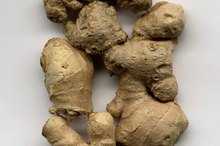The Best Herbs for Treating Stomach Ulcers
A stomach ulcer, or peptic ulcer, is a lesion in the gastric lining. One common cause is H. pylori, a bacterium that can be treated with medications. Anti-inflammatory medicines, smoking, alcohol abuse and poor diet are other factors associated with peptic ulcers. Symptoms may mimic hunger, with pain and burning below the breastbone. Discomfort may be worse after or between meals; it is usually relieved by drinking milk or taking antacids. Although herbs may relieve symptoms or aid healing, home remedies should not substitute for diagnosis and treatment by a health-care professional.
If you are experiencing serious medical symptoms, seek emergency treatment immediately.
Ginseng
Panax ginseng root may have antimicrobial properties; it is a traditional remedy for infection. Researchers at Ajou University School of Medicine in Korea tested another variety, red ginseng, against infected gastric cells with DNA damage caused by H. pylori. S. Park and colleagues observed that red ginseng extract inhibited the growth of H. pylori and protected against cell damage. Results of the study, published in the July 2005 "Digestive Diseases and Sciences," suggest the herb could be a natural medicine to treat peptic ulcers caused by infection. Broccoli sprouts, garlic and cranberry are other plants reputed to fight H. pylori bacteria.
- Panax ginseng root may have antimicrobial properties; it is a traditional remedy for infection.
- Researchers at Ajou University School of Medicine in Korea tested another variety, red ginseng, against infected gastric cells with DNA damage caused by H. pylori.
DGL Licorice
Licorice for Gastritis
Learn More
Ordinary licorice contains glycyrrhizinic acid, a substance responsible for the herb's side effects of blood pressure elevation and numerous drug interactions. Deglycyrrhizinated, or DGL, licorice is a form thought to be safe for long-term use, as the harmful ingredient has been removed. The University of Maryland Medical Center reports that DGL licorice may protect against stomach damage from nonsteroidal anti-inflammatory medications such as aspirin and ibuprofen 2. Licorice may be combined with other herbs, such as bupleurum and agelica, to treat uclers. Do not confuse licorice with anise, which is used to flavor candies. Nutritionist Phyllis Balch, author of "Prescription for Nutritional Healing," states that taking DGL licorice between meals may be as effective as the drugs cimetidine or ranitidine for the treatment of peptic ulcers 3.
- Ordinary licorice contains glycyrrhizinic acid, a substance responsible for the herb's side effects of blood pressure elevation and numerous drug interactions.
- Deglycyrrhizinated, or DGL, licorice is a form thought to be safe for long-term use, as the harmful ingredient has been removed.
Aloe Vera Juice
Balch states that the juice of the aloe vera plant, a succulent native to many warm climates, aids in pain relief and speeds healing. Purchase a food grade product for internal use. Teas made from marshmallow root, slippery elm bark or flax seeds may also soothe irritated gastric mucusa. Rhubarb juice is a traditional remedy for bleeding caused by peptic ulcers. If you experience a sudden increase in abdominal pain, vomiting blood or what looks like coffee grounds, and bloody or black tarry stools, these are signs of serious complications that require immediate medical attention.
- Balch states that the juice of the aloe vera plant, a succulent native to many warm climates, aids in pain relief and speeds healing.
- Rhubarb juice is a traditional remedy for bleeding caused by peptic ulcers.
Related Articles
References
- Pubmed.gov: Rescue of Helicobacter Pylori-Induced Cytotoxicity by Red Ginseng
- University of Maryland Medical Center: Peptic Ulcer
- "Prescription for Nutritional Healing"; Phyllis Balch, CNC, 2004
- Sumbul S, Ahmad MA, Mohd A, Mohd A. Role of phenolic compounds in peptic ulcer: An overview. J Pharm Bioallied Sci. 2011 Jul;3(3):361-7. doi:10.4103/0975-7406.84437
- Safavi M, Sabourian R, Foroumadi A. Treatment of Helicobacter pylori infection: Current and future insights. World J Clin Cases. 2016 Jan 16;4(1):5-19. doi:10.12998/wjcc.v4.i1.5
- Deding U, Ejlskov L, Grabas MP, et al. Perceived stress as a risk factor for peptic ulcers: a register-based cohort study. BMC Gastroenterol. 2016;16(1):140. doi:10.1186/s12876-016-0554-9
- Sumbul S, Ahmad MA, Mohd A, Mohd A. Role of phenolic compounds in peptic ulcer: An overview. J Pharm Bioallied Sci. 2011 Jul;3(3):361-7. doi:10.4103/0975-7406.8443.
- Boltin D. Probiotics in Helicobacter pylori-induced peptic ulcer disease. Best Pract Res Clin Gastroenterol. 2016;30(1):99-109. doi:10.1016/j.bpg.2015.12.003.
- Matsushima M, Suzuki T, Masui A, et al. Growth inhibitory action of cranberry on Helicobacter pylori. J Gastroenterol Hepatol. 2008;23 Suppl 2:S175-80. doi:10.1111/j.1440-1746.2008.05409.x.
- Penn State Hershey Health Information Library. Peptic Ulcer.
Resources
Writer Bio
Mary Earhart is a registered nurse, a public health nurse and licensed midwife. Her articles have appeared in professional journals and online ezines. She holds a Bachelor of Science in nursing from California State University at Dominguez Hills. She works in a family practice clinic, has a home birth practice and her specialty is perinatal substance abuse.









